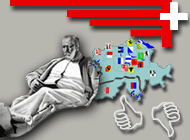Swiss votes reveal deep cultural divisions between regions

The deep cultural divisions between the different language regions of Switzerland were highlighted once again on Sunday after a series of votes on federal issues.
With all results counted, voters clearly turned down a proposal to cut army spending, and two initiatives to introduce a more flexible retirement age.
The results on the defence issue indicated a division between German-speaking cantons and most French-speaking cantons, which came out in favour of slashing spending.
There were also considerable differences over the two votes on a flexible retirement age. All German-speaking cantons came out against the proposals, while most of French-speaking Switzerland, as well as the southern canton of Ticino, voted in favour.
Similar divisions have been reflected in past votes on such issues as European integration, the environment, social security and the army.
Government ministers welcomed the outcome of the votes, which all went the way the cabinet had recommended. But the interior minister, Ruth Dreifuss, commenting on the pension vote, said the regional differences would have to be taken into account.
Final results from Sunday’s defence spending vote showed 62 per cent against the move to slash the army’s current annual budget of SFr5 billion ($2.75 billion) to just over SFr3 billion ($1.7 billion) over the next decade.
The move had been given little chance of success, as it was opposed by three of the four government parties. The government and parliament had warned that approval of the measure would damage the country’s defence capability and lead to massive job cuts.
Under the proposal, part of the money saved would have been used for international projects to promote peace, including development aid and disarmament.
The move to be more flexible on the age of retirement was clearly defeated. Forecats published by the Swiss Broadcasting Corporation two hours after polls closed, showed one initiative was rejected by 64 per cent of voters, the other by 56 per cent.
Supporters of the measures had wanted to give people the option of retiring at 62 without losing their right to a full pension. Men in Switzerland are currently eligible for a pension at 65, while the retirement age for women is slightly lower.
The groups behind the two people’s initiatives were the Green Party and the associations of office workers, supported by the trade unions and the Social Democratic Party.
The government, parliament and three of the four main political parties had said a flexible retirement age would cost an additional SFr2 billion (about $1 billion) annually and that this would lead to serious financial problems in the old age pension scheme.
The Swiss electorate voted on two other federal issues:
* They accepted the government’s proposal to abolish the status of civil servants – a move which the more than 100,000 people employed by the federal administration, post office and federal railways, fear could lead to a lack of job security and arbitrary pay settlements.
* They rejected a move by a retail chain to scrap compulsory medical insurance, for everything but hospital costs.
swissinfo with agencies

In compliance with the JTI standards
More: SWI swissinfo.ch certified by the Journalism Trust Initiative
You can find an overview of ongoing debates with our journalists here . Please join us!
If you want to start a conversation about a topic raised in this article or want to report factual errors, email us at english@swissinfo.ch.